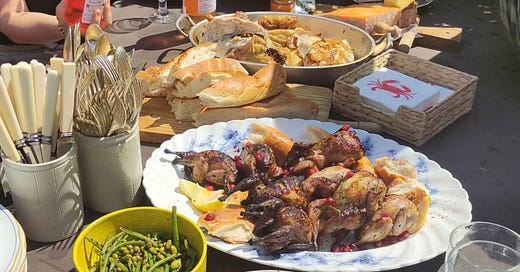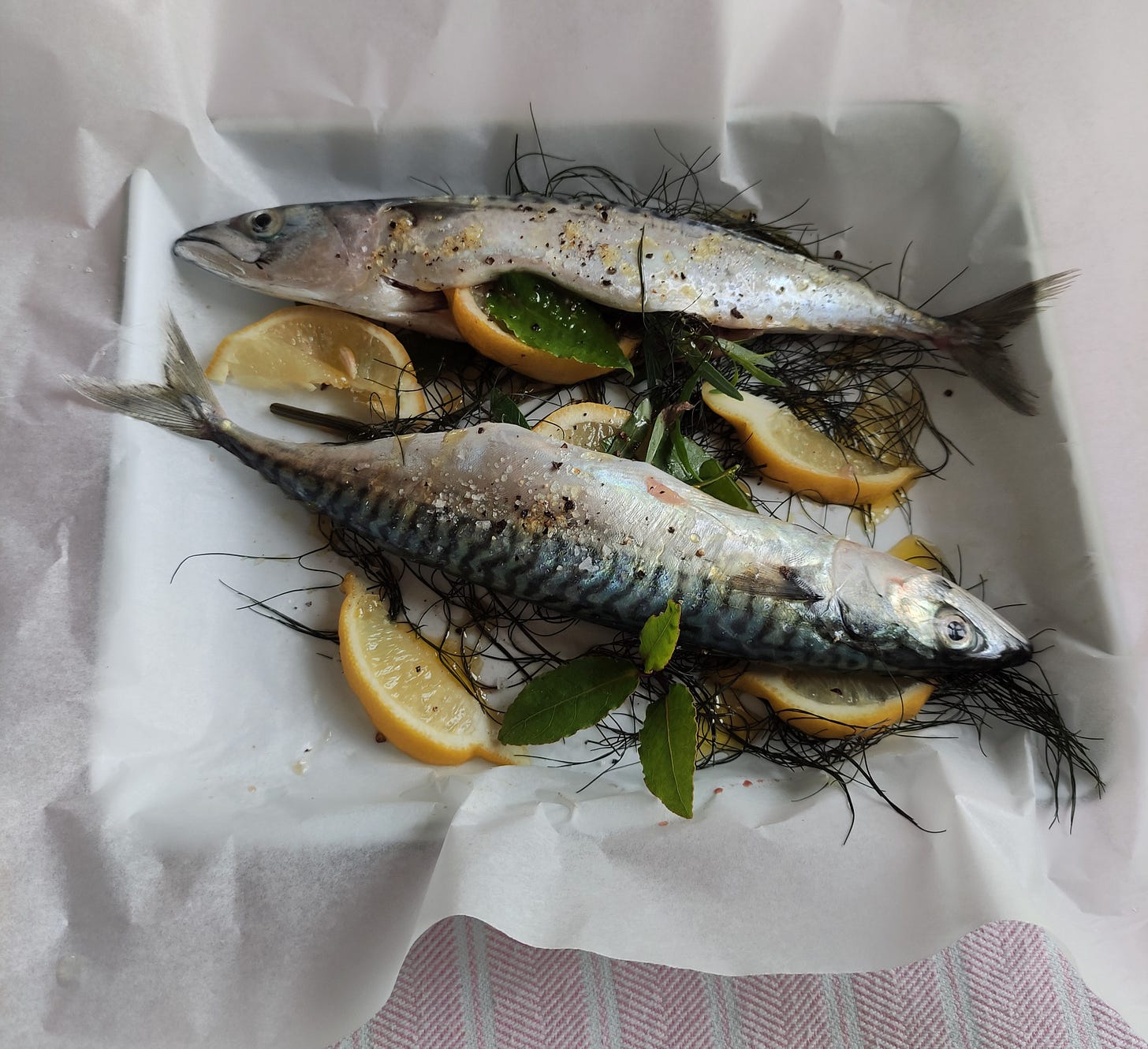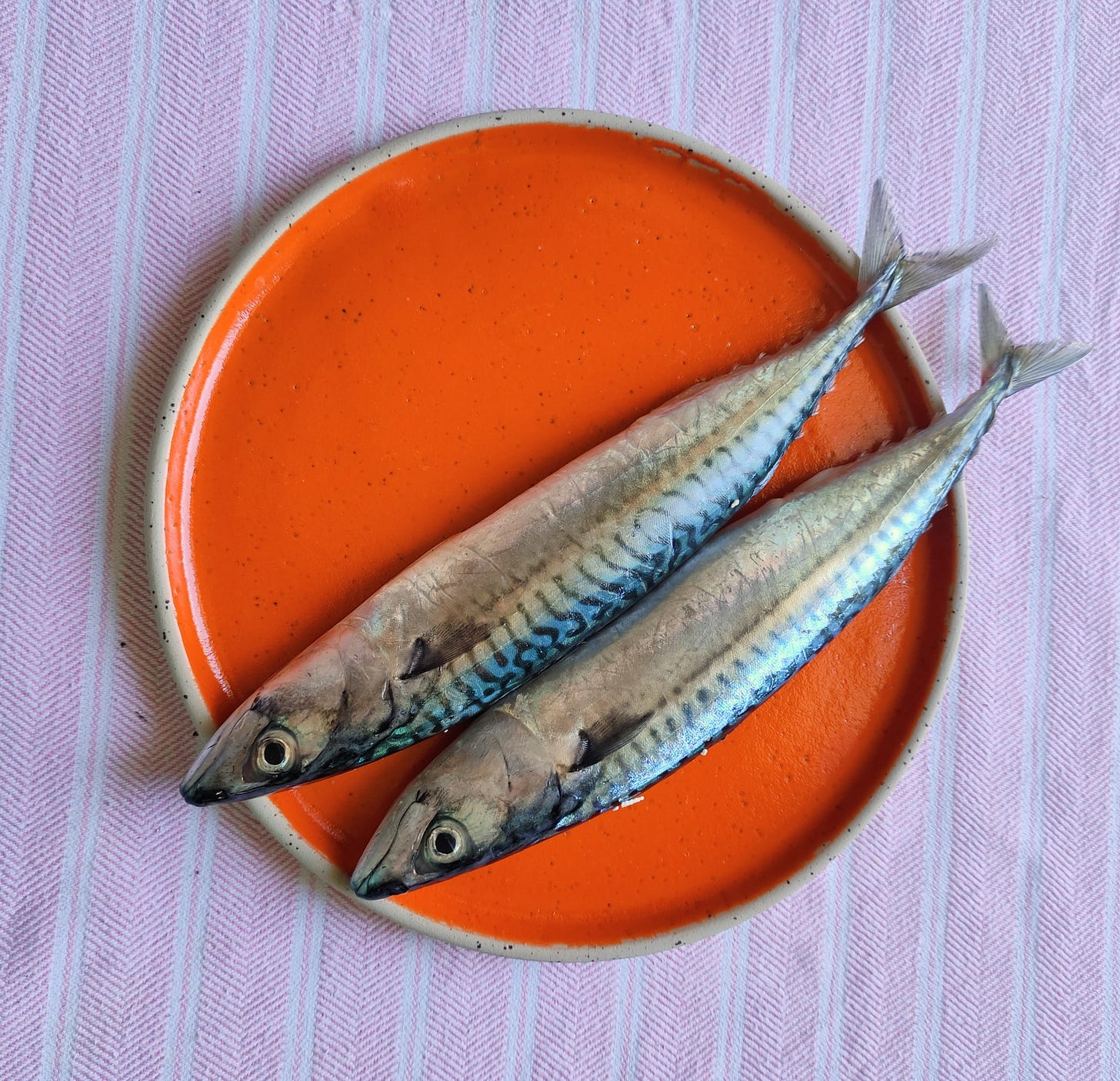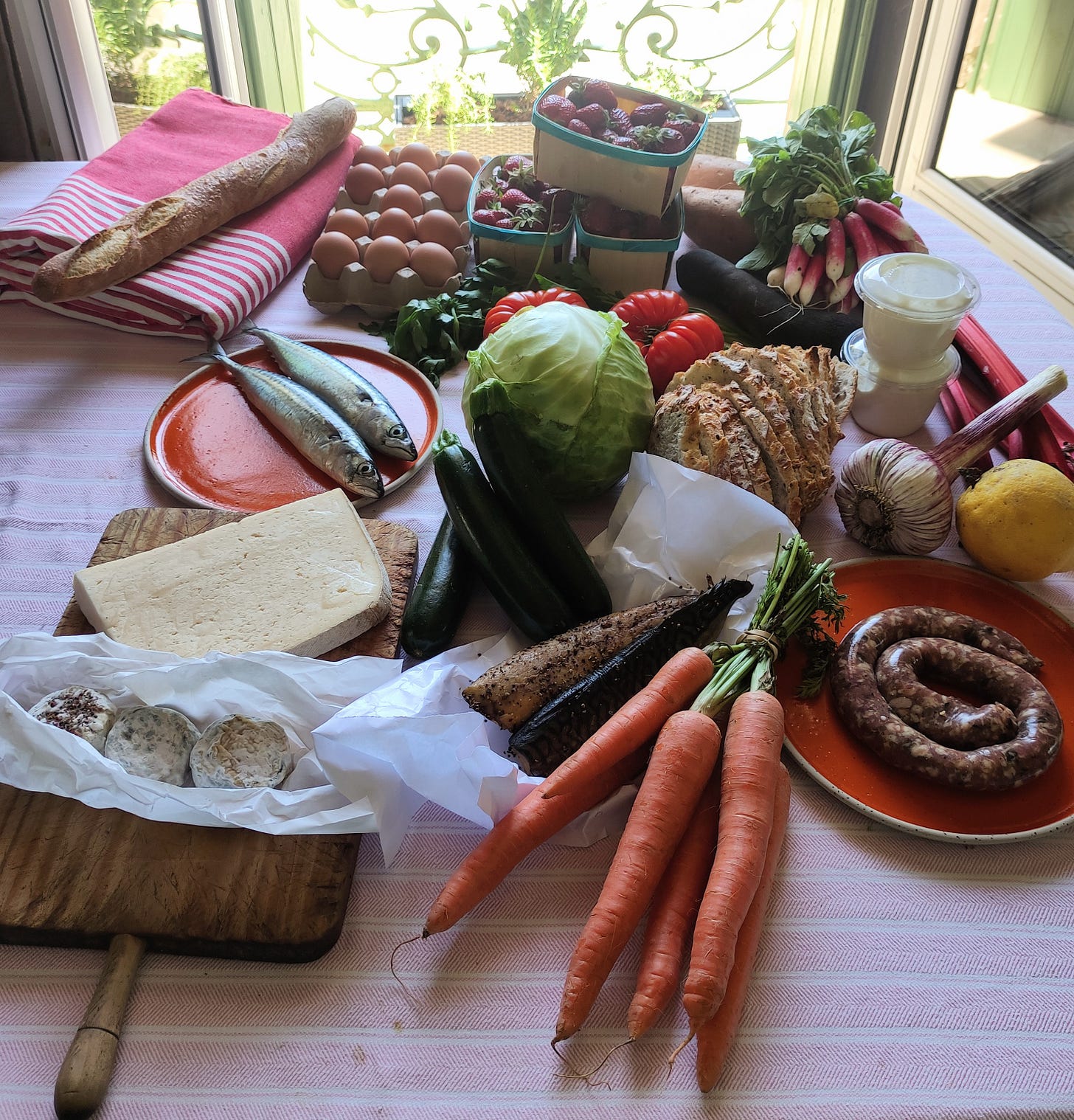Twelve things I’ve learned about French life
This week, French lessons, a nice thing happened, and a recipe for mackerel rillettes.
Since we moved here, my study of French anthropology of the early part of the Twenty-First Century, largely conducted in the Marine Bar, on the vinyl banquettes of Le Relax, and up and down the port, has revealed some interesting results. This is not a controlled experiment.
Always say bonjour. Then possibly say bonjour again. And definitely say au revoir, bonne journée, bonne fin d’après midi, bonne continuation, bon week end possibly bonne fin de semaine, or any one of the other many phrases designed to acknowledge that you’ll be off now, but you’ve enjoyed your interaction, you’ve acknowledged the humanity of the other person, and you can all now go about your day, week, weekend. I was in the market yesterday and the always-delightful man on the handbag stall confided in me that no one says bonjour anymore, that he is one of 13 children and however much his mother had on her plate, she always raised them with manners. Un peu de courtoisie, politesse! I am sad some of his customers are more bonjour’d against than bonjouring. These small, daily greetings are the bonbons scattered across my day, from hairdresser, to doctor’s office to tabac.
But don’t go overboard. The French are not a flowery people. I love the bit that brilliant Tatty MacLeod does about realising there is no such phrase in French as people pleaser. One Saturday morning in Pézenas, I was trying to assemble enough chairs on the terrace of the Café des Arts for our group of friends. Now, if you’ve ever been to the Café des Arts in Pézenas on a Saturday morning, it’s market day and it’s mental. I asked a very well-turned-out elderly couple if I could take one of their chairs and the man said yes of course, and I said thank you too kind and we we’re both there twinkling at each other for a bit when his wife, our lady of the silver bob helmet, pearls and silk scarf, deadpanned me a “C’est normal”. It’s normal. Don’t go on. Goodbye. This is just to say, in some circumstances it behoves you to moderate any Golden Retriever instincts.
In France, original is not a compliment whereas in England, it’s possibly the highest praise you can give someone. Here it’s the thing people say if they are too polite or in too much of a hurry to say are you quite well in the head?
If you’re a pedestrian, bear in mind that zebra crossings are merely a suggestion to drivers. And don’t be fooled by the charming-sounding trottinette – scooter people to a man, woman and child are homicidal maniacs.
With all the handshaking and cheek-kissing, the bonjouring, bonsoiring and aurevoiring, it can take longer to arrive at and leave a party than you spend at a party.
Going to some friends for drinks or dinner? If it’s a proper old-school household, no one gets a drink before everyone is there. Sometimes people are late, le quart d’heure de politesse and all that. Sometimes, I wish I’d packed a hip flask. I don’t drink very much generally, but there’s nothing like standing about empty handed trying to summon up questions about people’s kids, art collection, garden, home improvements to make me feel like I could down an alcopop in one (do alcopops still exist?). I don’t drive, so I have no opinions on parking or what route you took to get there. I simply cannot do that conversation dry.
While we’re at an old-school dinner, let’s talk about bon appétit for a second. It was probably one of the first French phrases many of us learned, slipping it to perfectly English social occasions, let alone French ones. And of course people say it here all the time, in homes, in restaurants, when spying a stranger enjoying a travel picnic on a serving station bench. But know your crowd. If for some reason, you find yourself at a very smart dinner, let those words die in your mouth. I did not know this and once said the b…a… thing, and the ancient grande dame on my left did look at me as though I had downed an alcopop or possibly mixed the champagne with Coca Cola. It reminds me of my husband’s English grandmother who thought talking about food at the table was terribly gauche, because of course the food was good and even if it weren’t, who cares? (Me, me, I care, it’s practically all I want to talk about.) Here, to some bon appetit sounds a little base, a little too much about your digestive tract, something that, if they absolutely must, should be left to waiters.
Let’s talk about water for a minute. Some visitors, especially Americans, can get quite worked up about the lack of ice in drinks and sometimes you hear other, more experienced, travellers explaining that French kitchens are small, often there is no big freezer and so on and so on. But though that is true, at least until quite recently anyway, it’s not the main reason. The main reason is that very cold water is bad for your digestion, as is drinking too much water with your food. If you try to drink ice cold water with cheese, expect someone to call an ambulance just in case. My favourite waiter honestly thinks it can kill you.
We’ve talked about this before, but along with the absence of ice, expect an absence of butter too. Unless you’ve ordered oysters, when little rounds of rye bread will be brought to the table with about enough butter to fry an omelette for a mouse, then you will be sans beurre. This is because the bread isn’t something to snack on while you’re waiting for your entrée. Do not touch the bread basket until your food is on the table. It is an accompaniment, something to eat with your food, and obviously to soak up the precious last puddles of sauce (there is even a verb for it, saucer). A word of warning though, I know we all do it – who can resist? – but it’s seen as entirely understandable if fairly low, at-home manners. Don’t mop the sauce so hard you might wipe the pattern from the plate. And as a rule of thumb, anyone who would find bon appétit gauche is going to rend her Hèrmes in despair if you saucer in front of her.
If you want your coffee to be served with your pudding you’re going to have to ask, so devoted are French restaurants to prolonging your pleasure. This is the antithesis of turning tables.
You’d be very unlucky if a waiter harasses you to pay. No one is bringing your bill to the table unless you ask for it. They’re not ignoring you, they’re indulging you. They want you to have a good time. Even when you signal you may be ready to pay, it’s not uncommon – even in quite splendid places – to have to go to the till or the bar to pay. Don’t sully the poetry of the table with tawdry commerce.
And finally, if you’re a grown person in control of your faculties, it’s poor form to eat except at mealtimes. We don’t snack and we don’t eat in the street. We are not barbarians. I’ve worked very hard at this – I didn’t need to work at the not eating in the street bit, I hate that and have always been an enormous failure at food festivals. HOWEVER between you and I, I sometimes stretch the concept of mealtimes. For example, at lunch, I like to eat in courses, so far so French. The crisp course might begin at 11am, followed by proper lunch with a salad and cheese and possibly a yoghurt, culminating with the final biscuit course at around 3pm.
I hope this helps. Here to serve (from the left, obviously).
A nice thing happened…
I just found out that this newsletter has been nominated for a Guild of Food Writers award. The ceremony is on June 18, so we’ll know then who has won, but in the meantime, I just wanted to thank all of you who read my recipes and stories every week, who subscribe, who comment and – best of all – share your own stories. Your support and encouragement means the world to me, as I sit here at my dining table tapping away, wondering if anyone really cares about who I bumped into in the Marine Bar today, what happened at the hairdresser, and why it’s a great idea to put an oyster shell in your kettle. You’re the best.
Rillettes de maquereaux
Mackerel pâté
Sometimes, you want something to go on toast, and this is just the ticket. It’s just a fancy version of the tuna pâté I used to make as a child (a tin of tuna, half its weight in butter, a squeeze of Jif lemon and some salt and pepper). Though this is smarter, it’s simple to make, impressive to eat, and you can keep it in the fridge for about three days. If you don’t have or like tarragon, it is just as good made with dill. Serve it on small toasts as a canapé, or with larger toasted bread with a green salad, as a starter or light-ish lunch. Biscuit course optional.
Serves 4-6
2 fresh mackerel, about 180g each, gutted, cleaned and rinsed well under cold water
2 unwaxed lemons
I grabbed some fronds of bronze fennel from the garden, but this isn’t essential, just me being Marie Antoinette
4-5 sprigs of tarragon
4-5 bay leaves
1-2 tbsp olive oil
2 fillets of smoked mackerel, about 100g each
1 tbsp very finely chopped shallot
60g salted butter, very, very soft
Salt and freshly ground black pepper
To serve: toasted baguette or other bread, lemon wedges
Heat the oven to 220C/200C Fan/Gas 7. Line a roasting tin with a large sheet of baking parchment, big enough to make a parcel for both the fish. Scatter some of the fennel fronds if you’re using it, a tarragon sprig or two, a few bay leaves and some lemon slices or wedges on the baking parchment, then lay the raw mackerel on top. Season the cavities with a little salt and pepper then place a bay leaf, tarragon sprig and a big slice of lemon inside each one. Trickle some olive oil over the top and season with salt and pepper. Lift up the sides of the parchment and scrunch the edges closed so the fish are encased in a loose parcel.
Bake for 10-12 minutes, remove from the oven and let them cool. Remove them from the parcels and gently pull off the skin. Next, carefully remove the flesh, being careful to remove any bones – look out for the tiny ones – and place it in a bowl. Discard the skin and bones.
Remove the skin from the smoked mackerel; discard the skin. Flake the flesh of the smoked mackerel into pieces and place it in the bowl with the fresh mackerel. Finely grate the zest of the second lemon over the mackerel, being careful not to remove any of the bitter white pith. Squeeze on 2 tbsp lemon juice. Remove the leaves from the remaining sprigs of tarragon and chop them quite finely and add them to the bowl, along with the shallot.
Season with salt and pepper, then gently combine with a fork or spatula. Next, beat in the butter – you want it to be very, very soft, almost on the point of melting.
Spoon into a jar or bowl, smooth the top and seal. Refrigerate for at least a couple of hours and up to three days, for the flavours to develop. If you like, you can spoon the rillettes into small, one-serving pots or jars, rather than one big jar.
Serve on hot, toasted baguette or other bread, with lemon wedges.
Printable Recipe
Market haul, 13 May 2025
This week’s market haul comprises carrots, three little goat’s cheeses. A slab of Cantal Entre Deux, two fresh mackerel, a baguette on a new hamam blanket – it’s one of my first signs of summer when the hamam towel seller arrives in the market, thirteen eggs, as is traditional, three punnets of Cléry strawberries, two sweet potatoes, a bunch of breakfast radishes, a black radish, two pots of fromage blanc, rhubarb, a new-season garlic, a lemon, garlic sausage, smoked mackerel, courgettes, cabbage, tomatoes, a boule of wholegrain bread.












My Swiss grandmother was very clear about cold water killing you. Not just with cheese! Certain death to have very cold drinks on a hot day. But also, the only acceptable beverages with fondue are white wine or tisane, anything else will make the cheese strangle you from the inside.
Congratulations, Debora! Well deserved and your newsletters are a delight. They make me 'homesick' for France and take me back to when I lived there for a year all those years ago. It's been a joy to watch your house being transformed and to read about life in a small French town. The ups and downs of settling into a new culture don't seem to have changed since I first moved to Spain a couple of decades ago.
And you can get smoked mackerel? One of the first things I make when I visit the UK is smoked mackerel paté. I know I could smoke my own, but it comes under the 'life is too short category'!
Enjoy the ceremony and hopefully you will come back the winner!